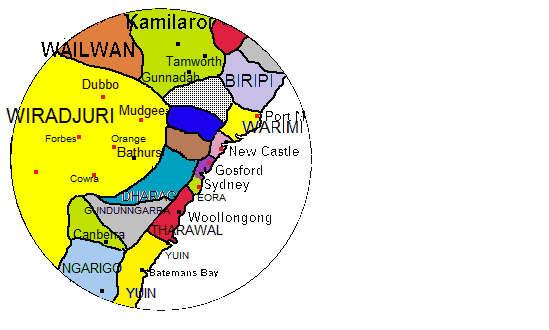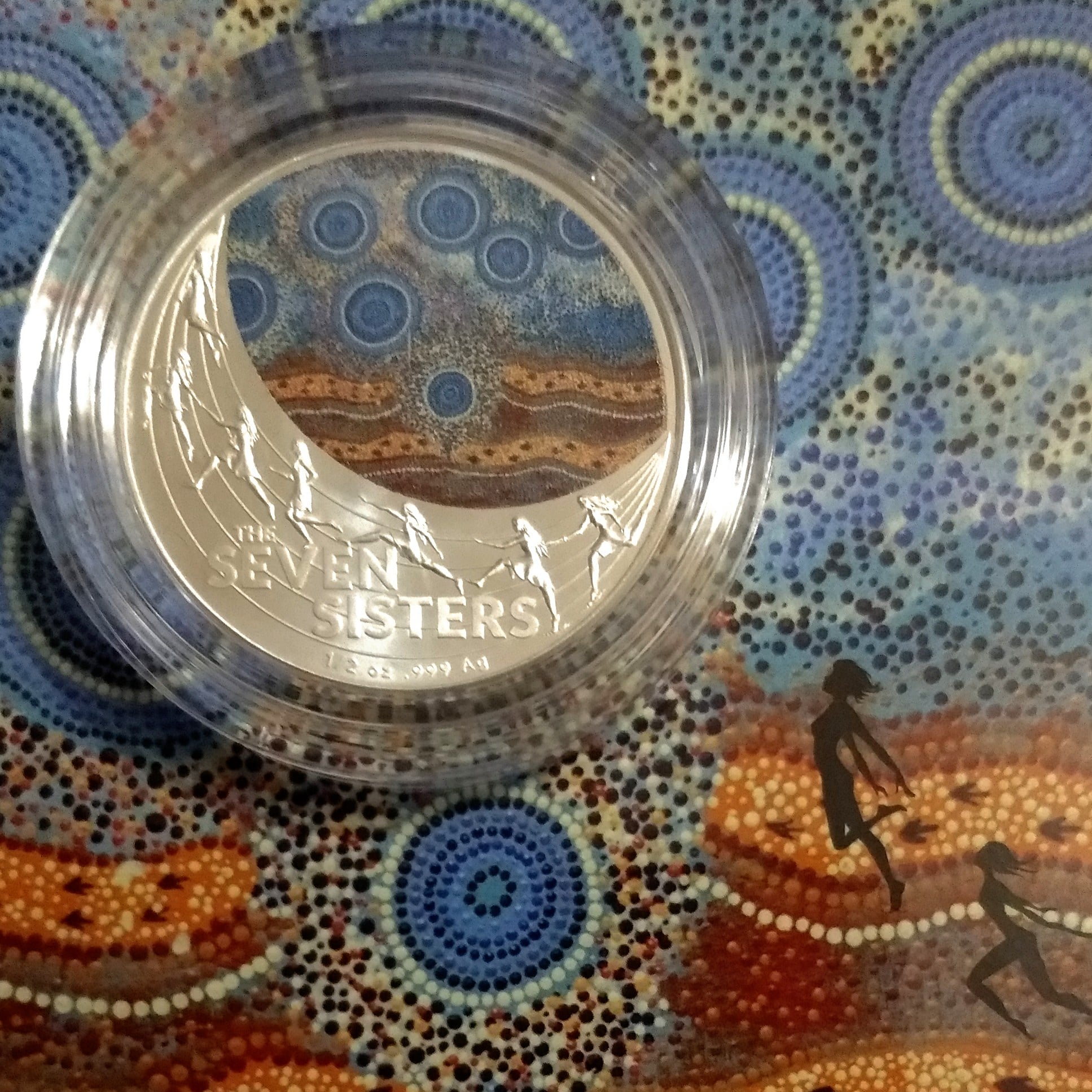|
Bahloo
In Gamilaraay mythology, Bahloo is a male spirit representing the moon. The most known tale about him is a story about the origin of death. Myths Bahloo and the Daens The most notable myth seeks to explain both man's mortality and the hatred between snakes and men, much as does the Judeo-Christian story of the Garden of Eden. In the tale, Bahloo takes his snakes (calling them his 'dogs') out for a walk at night. He comes upon a group of men and asks them to carry the snakes across a river for him. They were afraid, and refused, so he did it himself, with two snakes coiled around each arm and one around his neck. He threw a piece of bark on the water, which floated, and a stone, which sank. He declared that he was like the bark, always rising again, but that the men would be like the stone, and sink to the bottom when they were dead. The men, who had always feared the snakes, now hated them and killed them whenever they saw one. Bahloo always sent more, to remind the people t ... [...More Info...] [...Related Items...] OR: [Wikipedia] [Google] [Baidu] |
Gamilaraay
The Gamilaraay, also known as Gomeroi, Kamilaroi, Kamillaroi and other variations, are an Aboriginal Australian people whose lands extend from New South Wales to southern Queensland. They form one of the four largest Indigenous nations in Australia. Name The ethnonym Gamilaraay is formed from , meaning "no", and the suffix , bearing the sense of "having". It is a common practice among Australian tribes to have themselves identified according to their respective words for "no". The Kamilaroi Highway, the Sydney Ferries Limited vehicular ferry "Kamilaroi" (1901–1933), the stage name of Australian rapper and singer the Kid Laroi and a cultivar of Durum wheat have all been named after the Kamilaroi people. Language Gamilaraay language is classified as one of the Pama–Nyungan languages. The language is no longer spoken, as the last fluent speakers died out in the 1950s. However, some parts have been reconstructed by late field work, which includes substantial recordings of ... [...More Info...] [...Related Items...] OR: [Wikipedia] [Google] [Baidu] |
Australian Aboriginal Religion And Mythology
Australian Aboriginal religion and mythology is the sacred spirituality represented in the stories performed by Aboriginal Australians within each of the language groups across Australia in their ceremonies. Aboriginal spirituality includes the Dreamtime (''the Dreaming''), songlines, and Aboriginal oral literature. Aboriginal spirituality often conveys descriptions of each group's local cultural landscape, adding meaning to the whole country's topography from oral history told by ancestors from some of the earliest recorded history. Most of these spiritualities belong to specific groups, but some span the whole continent in one form or another. Antiquity An Australian linguist, R. M. W. Dixon, recording Aboriginal myths in their original languages, encountered coincidences between some of the landscape details being told about within various myths, and scientific discoveries being made about the same landscapes. In the case of the Atherton Tableland, myths tell of the orig ... [...More Info...] [...Related Items...] OR: [Wikipedia] [Google] [Baidu] |
Gamilaraay Language
The Gamilaraay or Kamilaroi language is a Pama–Nyungan languages, Pama–Nyungan language of the Wiradhuric languages, Wiradhuric subgroup found mostly in south-eastern Australia. It is the traditional language of the Gamilaraay, Gamilaraay (Kamilaroi), an Aboriginal Australian people. It has been noted as endangered, but the number of speakers grew from 87 in the 2011 Australian Census to 105 in the 2016 Australian Census. Thousands of Australians identify as Gamilaraay, and the language is taught in some schools. Wirray Wirray, Guyinbaraay, Yuwaalayaay, Waalaraay and Gawambaraay are dialects; Yuwaalaraay/Euahlayi is a closely related language. Name The name Gamilaraay means '-having', with being the word for 'no'. Other dialects and languages are similarly named after their respective words for 'no'. (Compare the division between ''langues d'oïl'' and ''langues d'oc'' in France, distinguished by their respective words for 'yes'.) Spellings of the name, pronounced in the ... [...More Info...] [...Related Items...] OR: [Wikipedia] [Google] [Baidu] |
Judeo-Christian
The term Judeo-Christian is used to group Christianity and Judaism together, either in reference to Christianity's derivation from Judaism, Christianity's borrowing of Jewish Scripture to constitute the "Old Testament" of the Christian Bible, or due to the parallels or commonalities in Judaeo-Christian ethics shared by the two religions. The term "Judæo Christian" first appeared in the 19th century as a word for Jewish converts to Christianity. In the United States the term was widely used during the Cold War in an attempt to suggest that the United States had a unified American identity which was opposed to communism. Theologian and author Arthur A. Cohen, in ''The Myth of the Judeo-Christian Tradition'', questioned the theological validity of the Judeo-Christian concept, instead, he suggested that it was essentially an invention of American politics. The use of Abrahamic religions as a term for the common grouping of faiths which are attributed to Abraham, the Baháʼí Fait ... [...More Info...] [...Related Items...] OR: [Wikipedia] [Google] [Baidu] |
Garden Of Eden
In Abrahamic religions, the Garden of Eden ( he, גַּן־עֵדֶן, ) or Garden of God (, and גַן־אֱלֹהִים ''gan-Elohim''), also called the Terrestrial Paradise, is the Bible, biblical paradise described in Book of Genesis, Genesis 2-3 and Book of Ezekiel, Ezekiel 28 and 31. The location of Eden is described in the Book of Genesis as the source of four tributaries. Various suggestions have been made for its location: at the head of the Persian Gulf, in southern Mesopotamia (now Iraq) where the Tigris and Euphrates rivers run into the sea; and in Armenia. Like the Genesis flood narrative, the Genesis creation narrative and the account of the Tower of Babel, the story of Eden echoes the Ancient Mesopotamian religion, Mesopotamian myth of a king, as a primordial man, who is placed in a divine garden to guard the tree of life. The Hebrew Bible depicts Adam and Eve as walking around the Garden of Eden naked due to their sinlessness. Mentions of Eden are also made in ... [...More Info...] [...Related Items...] OR: [Wikipedia] [Google] [Baidu] |
Australian Aboriginal Astronomy
Australian Aboriginal astronomy is a name given to Aboriginal Australian culture relating to astronomical subjects – such as the Sun and Moon, the stars, planets, and the Milky Way, and their motions on the sky. Traditional Aboriginal culture and mythology and religion include many components of astronomy, and these traditions have been passed down orally, through ceremonies, and in their artwork of many kinds. The astronomical systems passed down thus show a depth of understanding of the movement of celestial objects which allowed them to use them as a practical means for creating calendars and for navigating across the continent and waters of Australia. There is a diversity of astronomical traditions in Australia, each with its own particular expression of cosmology. However, there appear to be common themes and systems between the groups. Due to the long history of Australian Aboriginal astronomy, the Aboriginal peoples have been described as "world's first astrono ... [...More Info...] [...Related Items...] OR: [Wikipedia] [Google] [Baidu] |
Australian Aboriginal Gods
Australian(s) may refer to: Australia * Australia, a country * Australians, citizens of the Commonwealth of Australia ** European Australians ** Anglo-Celtic Australians, Australians descended principally from British colonists ** Aboriginal Australians, indigenous peoples of Australia as identified and defined within Australian law * Australia (continent) ** Indigenous Australians * Australian English, the dialect of the English language spoken in Australia * Australian Aboriginal languages * ''The Australian'', a newspaper * Australiana, things of Australian origins Other uses * Australian (horse), a racehorse * Australian, British Columbia, an unincorporated community in Canada See also * The Australian (other) * Australia (other) * * * Austrian (other) Austrian may refer to: * Austrians, someone from Austria or of Austrian descent ** Someone who is considered an Austrian citizen, see Austrian nationality law * Austrian German dialect * Someth ... [...More Info...] [...Related Items...] OR: [Wikipedia] [Google] [Baidu] |



